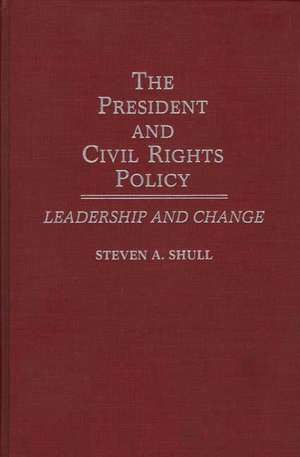The President and Civil Rights Policy: Leadership and Change: Music Reference Collection,, cartea 231
Autor Steven Shullen Limba Engleză Hardback – 25 apr 1989
The most thorough, systematic, and historical examination of the interrelations of the president and other participants in civil rights policymaking, The President and Civil Rights Policy investigates the process from agenda setting through implementation and even reviews policy impact. Emphasizing the themes of leadership and change, Shull surveys the numerous policy tools available to a president committed to policy change. Although historical components are reviewed, the stress here is on the contemporary presidency. Included is a ground-breaking, detailed assessment of the Reagan administration that provides our first look at the president's role in a vital issue across the entire policymaking process. Shull finds that the American president is the most prominent catalyst for most public policy programs, with domestic issue areas like civil rights, often allowing the greatest discretionary latitude. This crucial issue functions as a barometer of presidential influence, priority, and action, as what presidents choose to do may be largely up to them. Some presidents, such as Lyndon Johnson, have initiated civil rights policies, whereas others, such as Ronald Reagan, have acted to restrict government's role and have turned back the civil rights clock. The main thrust here is that committed presidents lead and without leadership, little change in policy occurs.
Various kinds of evidence from quantitative data on statements, actions, and results, as well as memoirs and interviews are used to document the presidents' impact on civil rights policy. More than forty tables scrutinize almost every perceivable aspect of this subject, from Major Events in the Struggle for Racial Equality to Average Expenditures (Outlays) for Civil Rights, and Characteristics of Federal District and Appellate Court Judges. The volume's four major divisions present a framework for the analysis, focus on the president's role in agenda setting and policy formulation, delineate the roles of others and their responses to presidents' statements and actions, and assess presidential impact. This timely and detailed study will be useful supplementary reading in graduate and advanced undergraduate courses in the presidency, American government, civil liberties, and in public policy courses, especially those using the process or content form of organization.
Din seria Music Reference Collection,
- 52%
 Preț: 250.68 lei
Preț: 250.68 lei - 21%
 Preț: 323.25 lei
Preț: 323.25 lei - 27%
 Preț: 345.42 lei
Preț: 345.42 lei - 42%
 Preț: 273.38 lei
Preț: 273.38 lei - 38%
 Preț: 344.63 lei
Preț: 344.63 lei - 31%
 Preț: 285.27 lei
Preț: 285.27 lei - 31%
 Preț: 284.24 lei
Preț: 284.24 lei - 51%
 Preț: 302.11 lei
Preț: 302.11 lei - 18%
 Preț: 320.42 lei
Preț: 320.42 lei - 30%
 Preț: 337.47 lei
Preț: 337.47 lei - 38%
 Preț: 435.80 lei
Preț: 435.80 lei - 43%
 Preț: 297.47 lei
Preț: 297.47 lei - 38%
 Preț: 441.21 lei
Preț: 441.21 lei - 51%
 Preț: 300.57 lei
Preț: 300.57 lei - 38%
 Preț: 437.67 lei
Preț: 437.67 lei - 33%
 Preț: 320.60 lei
Preț: 320.60 lei - 52%
 Preț: 251.90 lei
Preț: 251.90 lei - 52%
 Preț: 251.27 lei
Preț: 251.27 lei - 28%
 Preț: 461.11 lei
Preț: 461.11 lei - 42%
 Preț: 271.39 lei
Preț: 271.39 lei - 33%
 Preț: 320.50 lei
Preț: 320.50 lei - 55%
 Preț: 149.61 lei
Preț: 149.61 lei
Preț: 438.41 lei
Preț vechi: 708.12 lei
-38% Nou
83.89€ • 89.71$ • 69.95£
Carte tipărită la comandă
Livrare economică 17 aprilie-01 mai
Specificații
ISBN-10: 0313265836
Pagini: 270
Dimensiuni: 156 x 234 x 16 mm
Greutate: 0.55 kg
Editura: Greenwood Press
Colecția Praeger
Seria Music Reference Collection,
Descriere
Various kinds of evidence from quantitative data on statements, actions, and results, as well as memoirs and interviews are used to document the presidents' impact on civil rights policy. More than forty tables scrutinize almost every perceivable aspect of this subject, from Major Events in the Struggle for Racial Equality to Average Expenditures (Outlays) for Civil Rights, and Characteristics of Federal District and Appellate Court Judges. The volume's four major divisions present a framework for the analysis, focus on the president's role in agenda setting and policy formulation, delineate the roles of others and their responses to presidents' statements and actions, and assess presidential impact. This timely and detailed study will be useful supplementary reading in graduate and advanced undergraduate courses in the presidency, American government, civil liberties, and in public policy courses, especially those using the process or content form of organization.















